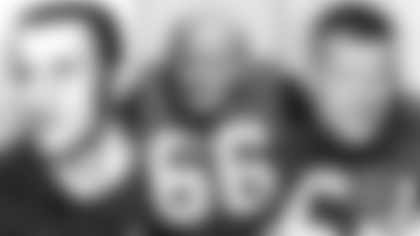Fourth in a seven-part series of "best of" drafts in Packers history.
So many of Ron Wolf's drafts followed the same pattern and had the same outcome, it's problematic to pick just one as his best.
Plus, it was more the cumulative effect of his drafts that led to the Green Bay Packers winning their third Super Bowl after a 29-year rut and becoming perennial winners, as well as Wolf being one of a handful of general managers inducted into the Pro Football Hall of Fame.
Three consecutive No. 1 picks in the three years leading up to Super Bowl XXXI were among Wolf's best but had short-lived careers. Guard Aaron Taylor and cornerback Craig Newsome suffered knee injuries that basically limited them to three seasons in Green Bay. The other, linebacker Wayne Simmons, simply wore out his welcome after four-plus seasons.
The distinctive feature of the 10 drafts while Wolf was GM – from 1992 to 2001 – was the mid- to low-round selections that emerged as highly productive, highly reliable players who helped sustain the team's remarkable revival from the woeful 1970s and '80s.
Let's start with this in-house decision. Although an argument could be made to include Brett Favre with the 1992 draft because he was acquired for a No. 1 pick that year based almost exclusively on Wolf's evaluation of him before the 1991 draft when he was working for the New York Jets. But in the books, Favre is listed as a trade acquisition, not a draft pick. Otherwise, it would be case closed if Favre was counted as part of the '92 draft. It would rank first.
Here are the six years that were considered for Wolf's best draft.

Fans can now register for free entry to the 2025 NFL Draft by downloading the NFL OnePass app or by registering online!
1992 – Two Super Bowl starters, running back Edgar Bennett (4th round) and tight end Mark Chmura (6th round), and what would have been a third, wide receiver Robert Brooks (3rd round) if he hadn't sustained a season-ending knee injury in the seventh game of 1996. Quarterback Ty Detmer (9th round) was Favre's backup in 1993 and until he got hurt in the ninth game in 1995. No. 1 pick Terrell Buckley didn't pan out in Green Bay, but he certainly can't be labeled a bust, considering he intercepted 50 passes in 14 NFL seasons. Inside linebacker Mark D'Onofrio (2nd round) won a starting job in training camp as a rookie but suffered a career-ending hamstring injury in his second game.
1993 – Three Super Bowl XXXI starters: Simmons, tackle Earl Dotson (3rd round) and cornerback Doug Evans (6th round). And they weren't merely starters, they were three of the most unsung players on that team. Defensive tackle Bob Kuberski (7th round) started three games in 1997 when the Packers won the NFC title. Safety George Teague, a second No. 1 choice that year, started 43 games in three years before being traded for a conditional draft pick. Quarterback Mark Brunell (5th round) threw only 27 passes in his one year as Favre's backup. But as far as a draft pick goes, he was one of Wolf's best. Brunell was the starting QB for five playoff qualifiers in his 17-year NFL career.
1995 – Five Super Bowl XXXI starters: Arizona's Newsome, North Carolina fullback William Henderson (3rd round), Southern Cal linebacker Brian Williams (3rd round), Virginia Tech wide receiver Antonio Freeman (3rd round) and South Dakota State guard Adam Timmerman (7th round). In addition, Travis Jervey (5th round) was a valuable special teams player during his four years with the Packers.
1998 – Defensive end Vonnie Holliday was arguably Wolf's best No. 1 pick, although he passed on Randy Moss to take him. Guard Mike Wahle, selected less than three months later as a second-rounder in the supplemental draft, was one of the best guards in the NFC from 2001-04, once the Packers found his best position. Wide receiver Corey Bradford (5th round) was a threat as a deep receiver and averaged more than 17 yards per catch when he caught more than 30 passes in both the 1999 and 2001 seasons. Like Brunell, quarterback Matt Hasselbeck (6th round) was one of Wolf's best picks. Although he attempted only 13 passes with the Packers, he played 17 years and led Seattle to the playoffs six times.
1999 – Wide receiver Donald Driver (7th round) holds the Packers' career records for receptions and receiving yards. Cornerback Mike McKenzie (3rd round) was a five-year starter before his falling out with Mike Sherman's coaching staff and departure in a forced trade. Josh Bidwell (4th round) was the Packers' punter for four seasons and quarterback Aaron Brooks (4th round) never appeared in a game for the Packers but was a starting QB for most of his seven NFL seasons.
2000 – What stands out more than anything was Wolf's selection of bookend tackles, Chad Clifton (2nd round) and Mark Tauscher (7th round), who started as rookies and basically for a decade or more. Better yet, they sealed the edges as pass protectors as reliably as any Packers' pair of tackles since the rule changes of the 1970s that changed the game into an aerial circus. Defensive end Kabeer Gbaja-Biamila (5th round) ranks second in all-time sacks for the Packers. Tight end Bubba Franks (1st round) used his size to become a red-zone, touchdown machine for Favre, if nothing else.
By the narrowest of margins, the 1995 draft gets the No. 1 ranking largely because it contributed the most to the Packers winning the 12th of their record 13 NFL championships.
Here's what Wolf said about his choices during or following the draft.
Newsome (5-11½, 185): "He is a solid, and I don't like to use this word, but it's apropos, a safe selection. He's a very good tackler and a very good cover man. Plus, his size will enable him to play the big receivers we have to face: (Cris) Carter, (Herman) Moore and (Alvin) Harper."
Henderson (6-1, 245): "Henderson is a particular kind of back that since we've been here the staff has wanted. He's more of a policeman, lead blocker, catch the ball type than a pile-driving fullback."
Williams (6-1, 238): "The thing we like most about Williams is the fact he never has to leave the field. He can play in space and at the point of attack. That's so vital today."
Freeman (6-0½, 180): "He's a very good punt returner. That's key."
Timmerman (6-3½, 290): "Timmerman is a tough, hard-nosed football player that should make our team. We honestly believe he should make our team."
Here was Wolf's assessment of his picks during interviews in 1999, 2005, 2014 and 2020.
Newsome: "Craig has had some tough breaks, but he played hard for us."
Henderson: "Harry Sidney (running backs coach) did a great job on William Henderson. That's why William Henderson ended up with the Packers. The way Harry presented William Henderson. You could see what type of fullback they wanted to run that offense. You could see William would fit the bill perfectly. But he had hurt his knee and it was just a matter of how he was going to come off that. He didn't play too well his senior year early, but then came on strongly at the tail end."
Williams: "He was really good. He would have been a Pro Bowl player, but he got hurt. You've got to be able to prop yourself and play in this league."
Freeman: "(Scout) Ray Wietecha did a superb job on Antonio Freeman. What Ray said about Freeman, if you put on a tape, you could see exactly what he was doing. He was a darn good player. I was one of those guys who always followed the tradition. Virginia Tech? Other than Bruce Smith, who the hell did they ever put in this league? But (Wietecha) did a great job. With Freeman, we wanted a third receiver and a returner."
Timmerman: "Kind of like when we got Tauscher. He's a seventh-round pick, but as soon as you get him, you go, 'Sh--, this guy ought to have been a second-rounder.' Timmerman same thing. You go, 'Holy smokes! This guy is a first- or second-round player.'"















